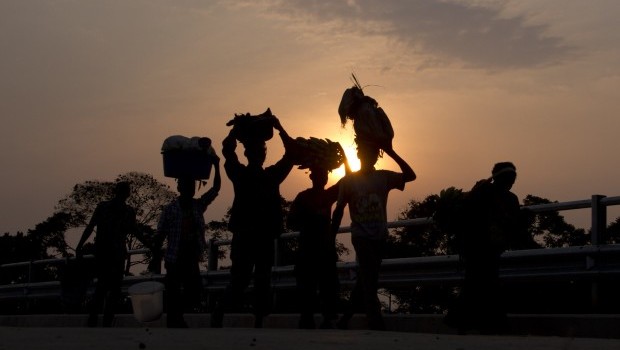
A refugee family from eastern Democratic Republic of Congo (DRC) walks on July 13, 2013 at the Busunga border in western Uganda. Source: AFP Photo/Isaac Kasamani
Kampala, AP—More than 60,000 Congolese have fled to Uganda after a rebel attack on a town near the border in a continuing influx that is stretching humanitarian capacities, an aid group said Sunday.
The Uganda Red Cross has already registered 41,000 refugees and that 20,000 more are yet to go through that process, said spokeswoman Catherine Ntabadde.
“Currently we are looking at about 65,000 people,” she said.
The refugees are entering Uganda though the frontier district of Bundibugyo and many have found temporary shelter on the campuses of three schools there, she said.
The refugee influx continues three days after a Ugandan-led rebel group attacked Kamango town and killed some people on Thursday, according to Ugandan military officials who are concerned the rebels are about to launch a major assault on Ugandan territory.
The offensive rebel group—the Allied Democratic Forces—had been hiding out in the jungles of eastern Congo for years since it was ousted from Ugandan territory. The group was formed in the early 1990s by Ugandan Muslims who said they had been sidelined by the policies of Uganda’s long-serving president and who want to rule Uganda according to Shariah law. The rebels at the time staged deadly terrorist attacks in Ugandan villages as well as in the capital, including a 1998 attack in which 80 students were massacred in a frontier town. A Ugandan military assault later forced the rebels into eastern Congo, where many rebel groups are able to roam freely because the central government has limited control there.
Ugandan military officials have been warning about the rebels’ resurgence for several months, but they now believe the rebels could be plotting an attack on Ugandan territory. The rebels have largely been quiet over the years, staging sporadic attacks on towns in eastern Congo and against Congolese military units. A United Nations report last year said those rebels “expanded their military capacity and cooperated” with Somalia’s al-Shabab militants. Ugandan officials do not know how many rebels are in the bush.
The rebels’ attack came at a time when another group, the M23 rebel movement, had seized the attention of regional and international diplomatic efforts to bring peace to eastern Congo.
Angelo Izama, a Ugandan analyst who runs a regional security consultancy called Fanaka Kwawote, said the attack by a long-dormant group highlights eastern Congo’s precarious security situation and the need for an ambitious “political solution” backed by Uganda and Rwanda, neighboring countries that in the past have sent their armies into Congo in pursuit of rebels hiding there.
In the case of Uganda, increased rebel activity so close to the border could hamper its young oil industry even before the first drops of oil flow. Uganda has discovered large quantities of crude on the Albertine belt along the border, and oil companies are drilling for more crude there.
“The main impact of the attack could be to draw Uganda back into Congo,” Izama said.
The Ugandan army spokesman, Lt. Col. Paddy Ankunda, on Friday ruled out the possibility of Uganda invading Congo in pursuit of rebels, saying the situation with the Allied Democratic Forces is not yet urgent.
